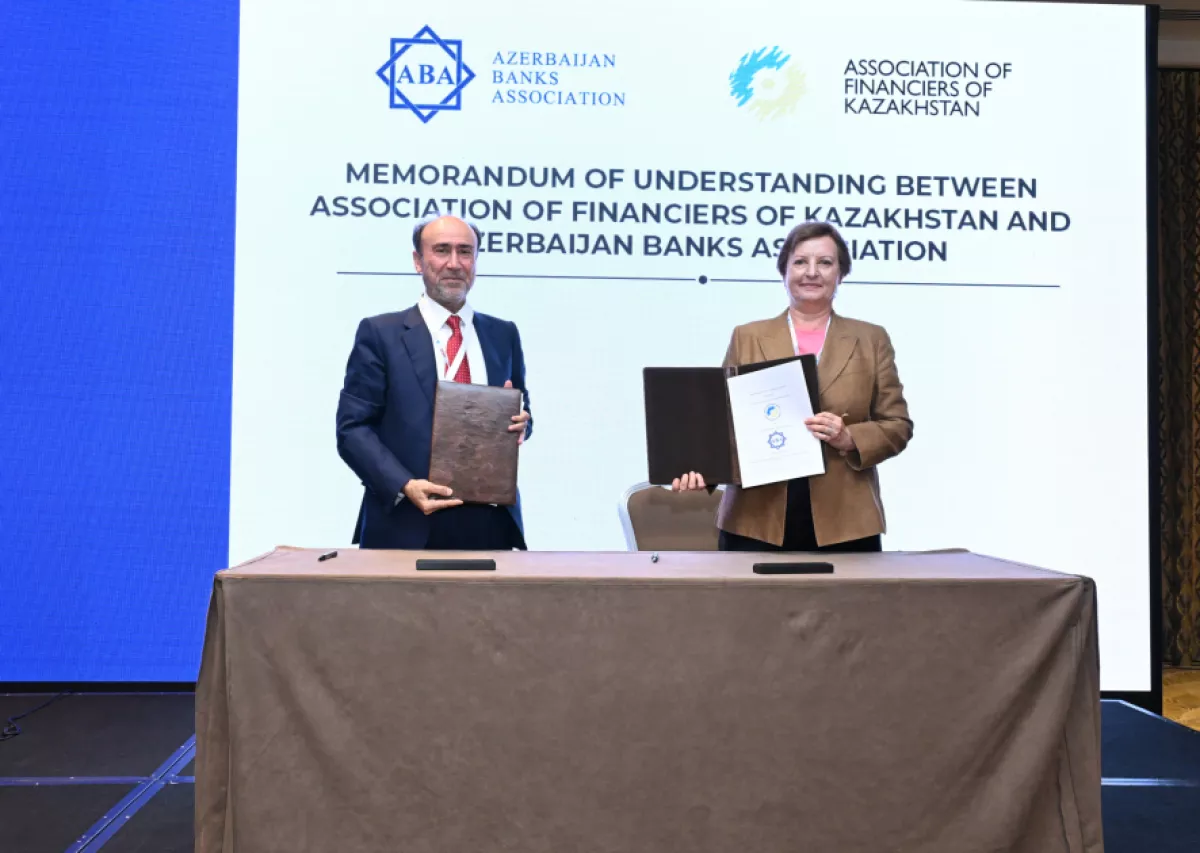Azerbaijan’s digital leap: Fintech at core of strategy Caliber.Az review
In recent years, Azerbaijan has made significant strides in expanding its cashless payment infrastructure—advancements that are driving the country’s banking and payment sectors to enhance e-banking services, develop innovative electronic platforms, strengthen cybersecurity, and accelerate the overall digitalisation of financial operations.
Ultimately, the widespread adoption of fintech solutions is a key condition for the full functioning of the Open Banking platform. These themes, among others, were at the centre of discussions at the Fintex Summit 2025, a major two-day event held recently in Baku.
Among the summit’s key outcomes was an agreement to create a Credit Bureau Platform for Turkic States, aimed at fostering greater financial integration and transparency across the region. Additionally, a memorandum of understanding was signed between the fintech associations of Azerbaijan and Kazakhstan.
In the coming years, the growth and success of global credit and financial institutions will increasingly depend on their ability to embrace digital transformation and integrate with modern fintech and electronic payment systems. In Azerbaijan, this shift was already evident during the peak of the COVID-19 pandemic in 2020. Since then, ongoing payment system reforms—now in their fifth year—have significantly accelerated the adoption of IT technologies and innovative software solutions across the banking sector, payment processors, and other financial service providers.
The digital transformation of Azerbaijan’s financial sector was thoroughly discussed on June 24–25 during seven panel sessions at the "Fintex Summit 2025 – Finance and Technology Exhibition." The event was organised with the support of the Central Bank of Azerbaijan (CBA) and the Azerbaijan Banks Association (ABA), in cooperation with the Ministry of Digital Development and Transport, the Centre for Analysis of Economic Reforms and Communication (CAERC), and Visa International.
The international forum, held under the theme “New trends in the banking and financial ecosystem: Digital integration, fintech partnerships, and cybersecurity,” brought together 1,500 delegates, including representatives from 300 international and regional organisations from the United States, the European Union, CIS countries, the Middle East, and the Asia-Pacific region.
In 2024, the total volume of transactions made with payment cards issued by Azerbaijani banks exceeded 126 billion manats ($74.1 billion) representing a 27 per cent increase compared to 2023. According to data from April 2025, the monthly volume of cashless payments has approached 10 billion manats ($5.9 billion), said Vusal Khalilov, a board member of the Central Bank of Azerbaijan, during the Fintex Summit.
"From January to April of this year, the volume of domestic cashless transactions grew by 67 per cent, while the number of such transactions increased by more than 91 per cent, meaning that 9 out of 10 payment card transactions are now conducted in a cashless form — a truly significant achievement," he noted.

According to data presented at the forum, the number of bank cards in Azerbaijan increased by 17 per cent year-on-year in the first four months of 2025, reaching 20.7 million. A significant portion of this growth came from contactless cards, which now account for 81 per cent of the market.
The country continues to develop its Instant Payment System (IPS), which enables 24/7 real-time transactions directly between bank accounts. Over the first four months of this year, IPS transaction volumes grew by more than 40 per cent.
Meanwhile, the volume of e-commerce increased 1.4 times during the same period. These results indicate that Azerbaijan has successfully achieved the main goals of digitalising financial services and promoting cashless payments, as outlined in the “State Program for Expanding Digital Payments in Azerbaijan for 2018–2020” and subsequent regulatory initiatives.
Today, Azerbaijan faces an important new challenge: to develop its Open Banking platform and implement a roadmap for introducing open banking mechanisms across all credit institutions in the country.
"The global fintech market could reach $700 billion by 2030, and in this context, Azerbaijan has set ambitious goals for itself. I am confident that between 2027 and 2030, the Central Bank of Azerbaijan [CBA] will be actively involved in developing the fintech ecosystem," said Vusal Gasimli, Executive Director of the Centre for Analysis of Economic Reforms and Communication (CAERC), during the forum.
“This includes decentralised finance DeFi, based on blockchain technology, embedded finance, regulatory technologies [RegTech], artificial intelligence [AI], and green technologies [GreenTech], all of which are planned to be integrated into the platform-based banking model of Azerbaijan,” he added.
To adopt the best practices from the global fintech industry—including technologies commonly used by neobanks and electronic money institutions—Azerbaijan is currently drafting several new laws. One key proposal is the “Virtual Assets Regulation” law, which, according to Fidan Tofidi, Head of Legal Support for Payments and Fintech at the Central Bank of Azerbaijan (CBA), would allow virtual assets to be used both as investment vehicles and payment methods. Ensuring their safe and secure entry into the market is a priority.
The CBA is also actively advancing the concept of open banking and plans to launch major projects in this area, according to Tofidi.
According to the CBA official, the company just met with banks and fintech companies to discuss a transformative project for the financial sector. She said that by leveraging open APIs, new products and services would emerge, providing equal opportunities for all participants and accelerating fintech innovation.
From 2024 to 2026, one of the main focuses will be developing a Central Bank Digital Currency (CBDC), with work already underway. The next phase will see a shift toward an “open finance” model—featuring a flexible, transparent regulatory framework—where the entire financial sector is connected through a unified API ecosystem, enabling the creation of innovative service models.

In connection with the development of innovative financial services, the Central Bank is also working on a draft amendment to the law “On Payment Services and Payment Systems,” said Ulfat Yusifov, Director of the Payment Services and Payment Systems Supervision Department at the Central Bank of Azerbaijan (CBA).
Recently, the regulator has received numerous requests from banks, payment institutions, and electronic money organisations related to the implementation of Banking-as-a-Service (BaaS), FinTech-as-a-Service (FaaS), and Software-as-a-Service (SaaS) solutions. According to Yusifov, these services help reduce infrastructure costs, advance digital transformation, and accelerate technological processes.
“However, there are risks associated with data security, technical dependency, and integration complexity. Therefore, the CBA plans to prepare a new regulatory framework that will enable the full implementation of these services in the country while minimising potential risks,” the official stated.
It’s important to recognise that fintech solutions around the world come with certain risks, especially concerning cybercrime. Because of this, the second day of the Fintex Summit 2025 focused on discussions around “Digital Finance Security: Innovations at the intersection of cybersecurity and fraud prevention”.
“Today, we live in an era of increasingly complex and rapidly evolving technologies integrated with IT systems. Alongside positive changes, there are also significant risks. Information systems and technologies can become targets of malicious interference, posing a serious threat to the financial sector,” said Mehdi Mehdizada, a representative of the Central Bank of Azerbaijan (CBA). He emphasised that, in this context, ensuring cybersecurity is becoming a top priority, serving as a key component of legal stability, financial resilience, and consumer protection.
It is worth noting that, thanks to the work carried out in recent years on the National Cybersecurity Index, Azerbaijan’s position in the international ranking—which covers 177 countries—has risen from 82nd to 20th place, with an overall score of 93.76.
“There is a direct correlation between the growth of cashless payments and the increase in cyberattacks and fraud. The Central Bank of Azerbaijan [CBA] is developing governance frameworks in IT, data management, and artificial intelligence. These frameworks are being shaped based on international standards and aim to enhance the resilience, security, and efficiency of organisational processes. We plan to present the final products to the sector in the near future,” said Vusal Khalilov, Deputy Chairman of the CBA, during the forum.
Similar efforts are underway within the Azerbaijan Banks Association, which aims to expand measures against fraud — antifraud.
“Antifraud refers to a set of measures and technological solutions designed to prevent fraud, including theft involving bank cards. It is important not only to use technical tools but also to actively inform the public. We strive to share our accumulated experience and implement innovations among participants in the financial market,” emphasised Zakir Nuriyev, President of the ABA.

The Fintex Summit underscored the importance of collaboration in advancing fintech solutions and fighting cybercrime, marked by the signing of a cooperation agreement between the Kazakhstan Association of Financiers and the Azerbaijan Banks Association. This partnership aims to share knowledge and innovations in open banking and digital transformation, including updates to legislation, as well as to strengthen cooperation on cybersecurity and antifraud systems—an area where Kazakhstan has significant experience.
Zakir Nuriyev also highlighted another key development at the forum in Baku: the signing of a Memorandum of Understanding to create a Credit Bureau Platform for Turkic-speaking countries. He explained that this platform will enhance the efficiency of credit bureaus and promote information and experience sharing among member countries.
According to Elena Bakhmutova, Chairperson of the Kazakhstan Association of Financiers, joint initiatives such as cross-border innovation hubs, along with open dialogue between the Central Banks of Azerbaijan and Kazakhstan and the private sector, have the potential over time to transform the Caspian region into a dynamic centre for digital finance.








